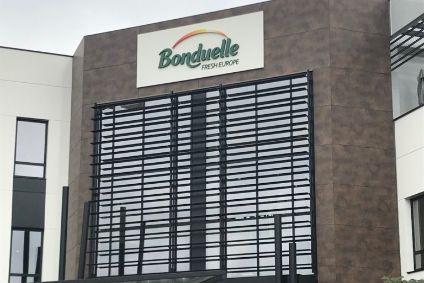
Bonduelle, the France-based vegetable-products supplier, still sees foodservice as a “long-term trend” to exploit despite sales coming under pressure during the Covid-19 pandemic.
The foodservice channel had been seen as one of Bonduelle’s growth engines and the company has not been alone among manufacturers to have witnessed sales slump as governments have imposed restrictions on the channel to try to contain the spread of the novel coronavirus.

Discover B2B Marketing That Performs
Combine business intelligence and editorial excellence to reach engaged professionals across 36 leading media platforms.
Pre-Covid-19, some 20% of Bonduelle’s annual sales were made to foodservice customers, a level that has dropped to around 16%. Bonduelle is over half-way through a financial year that ends in June and, by the end of that month, the company expects its sales to the channel to be down by 20-30%, deputy CEO Grégory Sanson told just-food on Friday (26 February) after the Paris-listed group posted its first-half financial results.
The near-term outlook for foodservice markets remains “uncertain” due to the pandemic, Sanson said. “Uncertain and [the impact of Covid-19] will become structural because, the more Covid lasts, the less there will be restaurants which will survive. That’s the point. Points of sale will disappear.”
However, he insisted foodservice remained a “long-term trend” Bonduelle will target. “People want not only to buy product but they want also to buy a service – and going to restaurants is buying a service,” he said. “In the longer term, there is no change in strategy.
“For the short run, foodservice will not be a growth engine and it will also negatively impact the growth for Bonduelle. We should be back [at] 20%, which is what we have in mind, I would say, by 2023, depending how this Covid crisis develops. It will also depend on the M&A strategy that we may have and so on but the longer-term [aim] is the development of the foodservice.”

US Tariffs are shifting - will you react or anticipate?
Don’t let policy changes catch you off guard. Stay proactive with real-time data and expert analysis.
By GlobalDataIn the six months to the end of December, Bonduelle saw its revenue dip 0.1% on a reported basis to EUR1.44bn (US$1.73bn). However, stripping out the impact of exchange rates, the company’s revenue was up 3.9%. The group said on Friday its “current operating income” fell 1.5% to EUR56.3m but added it saw a 5.2% increase on a like-for-like basis once foreign exchange was removed from the numbers. Bonduelle’s consolidated net income rose 8.3% to EUR31.9m.
For the year as a whole, Bonduelle is forecasting its revenue will rise by 1-2% on a like-for-like basis. The company is also predicting its current operating margin will be between 3.6% and 3.8%, compared to the 3.8% it booked in its previous full financial year.
Sanson said stronger sales of canned and frozen products in the retail channel had been a factor in the growth of Bonduelle’s underlying sales in the first half of the year. Sales of fresh products had been “definitely weaker” as shoppers visited stores less often.
Pre-Covid, some 40% of Bonduelle’s annual sales were of fresh products, with 35% through canned lines and 25% frozen. Presently, canned products account for 41% of sales, another 36% come via fresh products and 23% through frozen food.
Over the current financial year as a whole, Sanson said Bonduelle expects to see its canned sales rise by around 5%, to see “1-2% growth” from sales of frozen products and for growth in fresh foods to be “zero”.
Broadly speaking, many canned- and frozen-food categories have seen elevated levels of growth over the last 12 months as consumers have stocked up on staples and visited stores less frequently. Two-thirds of Bonduelle's frozen-food sales are made through the foodservice channel but, asked to outline how the company sees its overall canned and frozen businesses performing in the years ahead, Sanson spoke of the confidence the group has for its frozen portfolio.
"We do expect the canned business to move from -1%, +1% [growth], depending on the situation, to something like +1-2%," he said. "Limited growth but positive growth, which was not the case before. We are more confident in the development of frozen foods because for people it's closer to nature. When you buy canned, it's preserved, the consistency of the product is different. We are very confident in the fact that frozen, which was [growing at] like 2-3% every year, could gain momentum thanks to Covid."
Asked how Bonduelle might aim to grow its frozen-food business, Sanson said the company could look to M&A, which he believes would be more likely outside Europe than within. He also said Bonduelle would look at innovation, especially around "prepared meals", but said the group needed to think differently about how it developed products.
"If we want to be more agile, probably we should enter into co-packing agreements, helping us to innovate and launch small series [of products] and not invest that much because it's very costly in frozen," he said. "We must be more agile in this respect and less capital-intensive. The day we discover a blockbuster [product], for sure, we will invest in our production facilities but we must be more pragmatic. We have an industrial culture at Bonduelle. We like plants and equipment and so on. Now the environment and consumer expectation is moving so fast, we must change our paradigm and mindset."





